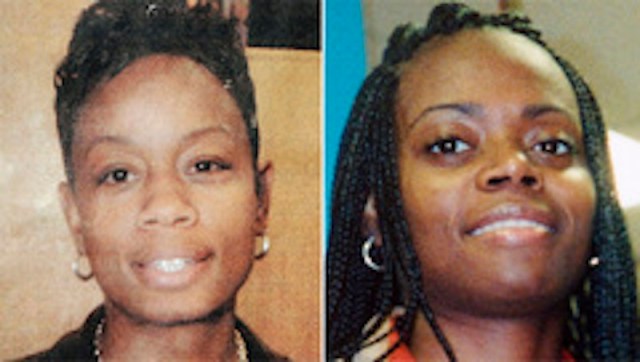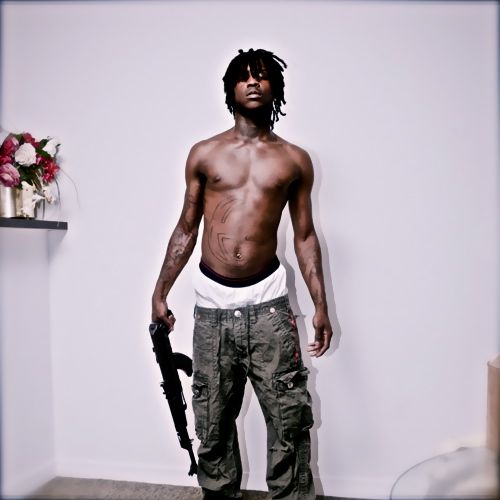“We only want justice, but sometimes it is not always clear what justice is when you are black in this country,” admitted Amina Baraka, wife of the late-poet Amiri Baraka, after prosecutors indicted James Coleman for the murder of their daughter, Shani Baraka, and her partner Rayshon “Ray-Ray” Holmes. On August 12, 2003, Coleman — estranged husband of Shani’s sister, Wanda Pasha — shot and killed the Black lesbian couple in Pasha’s home. A little more than a decade later, Amina Baraka’s words ring true again as yet another Black lesbian couple is slain in Houston, TX. Justice, indeed, is not always clear when you are Black, and queer, and a woman in this country and the threat of violence is never too far removed from you.

via NJ.com
Perhaps the most harrowing component of these killings is that the perpetrator(s) of such violence are not the strangers we women have been socialized to fear, but often family members who we should be able to trust — men who feel threatened by women in committed relationships with other women. In a brilliant piece on Out called “When Black Lesbians Are Killed by Black Men“, Darnell Moore reflects on the prevalence of violence directed at queer Black women and charges Black men with the task of acknowledging, abandoning, and reconciling these daily acts of violence.
“Thus, like Shani and Ray-Ray, like Shani’s older lesbian aunt (and Amiri’s sister) Kimako before her, like 15-year-old lesbian Sakia Gunn who like Shani called Newark home, black lesbians Britney Cosby and Crystal Jackson from Houston, Texas, were killed by Black men—some of whom were family members. And whether the force that propelled the use of gun, or hand, or knife in the cases referenced above was sexism, misogyny, disdain of homosexuals, or all of the above, the killing of black women, black women loving women, by black men is a clarion reminder that the want for power and the afforded privileges offered to straight/queer/trans men folk—black, brown, and white—has dangerous and violent consequences. Murder is but one.”

Without pathologizing Black people or suggesting that Black people are more inclined to be homophobic than any other ethnic group (which is false), I do want to emphasize that this phenomenon of violence towards Black women with same-sex desires or attractions is a Black issue. In 2012, 73% of anti-LGBTQ murder victims were people of color, and of the victims whose ethnicities were detailed, 54% of these murder victims were Black/African American. In the GLAAD study of Hate Violence in 2012, the writer observes “Black and African-American people were particularly overrepresented in the homicide rates [in 2012]: over half of the reported hate murders had Black or African American victims, even though Black and African-American people made up only 15% of total survivors and victims of hate crimes overall.” The conditions only worsen for queer Black women, the majority of whom were trans women.
HuffingtonPost Live invited a panel of queer Black individuals, including Moore, to discuss the question of Black men inflicting violence on queer Black women. Panelists agreed that this violence manifests at the intersection of racism, sexism, and homophobia; because queer Black women have more identities that are marginalized, their bodies become sites for hatred in an anti-Black, anti-woman, anti-LGBTQ society. Our anti-Black society does not value Black people’s lives the way it values white people’s lives. This distinction becomes obvious in the way that, even when the media addresses the deaths of Black people, it finds some backhanded way to stigmatize them (like when news outlets attacked Trayvon Martin for school suspensions and possible weed possession or emphasized how drunk Renisha McBride was the night she was murdered).
Furthermore, sexism privileges Black masculinity. Black communities’ convoluted relationships with gender trace as far back as slavery, which, as an institution, idealized white masculinity and took every opportunity to remind Black men that they could never access white men’s patriarchal power. Since that epoch in history, Black communities have had a fixation with preserving some mythical brand of Black masculinity, in an effort to never see it as delegitimized and disparaged as it was during slavery. For example, Black rights movements and events, like the Civil Rights Movement and the Million Man March, relied on ideas about Black men assuming their rightful place as the head of the family and taught Black men that they are entitled to Black women’s bodies. Unfortunately, this masculinity is often tied to violence. Many Black families are structured on notions that violence is corrective and that Black men are entitled to exact punishment to maintain order and show their dedication to and investment in their families. In her book, The Will to Change: Men, Masculinity, and Love, bell hooks explains, “Boys are encouraged by patriarchal thinking to claim rage as the easiest path to manliness. It should come to no surprise, then, that beneath the surface there is a seething anger in boys, a rage waiting for moments to be heard.” Coupled with institutionalized homophobia, which shames people for any semblance of homosexual attraction, desire, or behavior, Black men learn to see any threat to heterosexual masculinity as subject to correction — whether through the raping of queer bodies or the psychic trauma of “de-gaying” rhetoric — or as worthy of eradication.

via Black Youth Project
When asked on HuffingtonPost Live how to repair this violence, Myisha Cherry, a philosophy professor at John Jay College, suggested that we must all mind our own business. She asserted that if we all respected each other’s desires and paid attention to our own lives, we would make progress in ending violence against queer Black women. I disagree; I think that “minding our own business” is complicit in the violence we see against queer Black women. This violence exists because depictions of masculinity, especially of Black masculinity, go unchallenged and remain intact. This violence destroys families and ends lives because it’s always someone else’s problem and the faces of queer Black women whose lives were stolen from them are distant, tragic images until the victim is a mother, a sister, an aunt, a friend, or maybe even you.
Violence touches the lives of queer Black women in a unique way. Not all LGBTQ people have the same access to, nor the guarantee of safety. I said earlier that the killing and devastation of queer Black women’s bodies is a Black issue, but Black people are neither the only one’s responsible for this phenomenon, nor do we make up the only communities culpable. Although injustice touches our lives differently, we all must hold ourselves accountable. I want our communities to stop glorifying violent masculinity and to commit ourselves to creating healthier depictions of manhood. I want LGBTQ communities to stop using “safe space” as a catchphrase and to verbally, emotionally, and physically defend queer Black women, whether on the dance floor, on the streets, or in our homes. Moore’s article challenges Black men, but it also challenges us all — especially queer folk — to examine the way we enact violence upon each other. Queer Black women’s safety, as well as all people’s safety, should be a concern for LGBTQ people everywhere.








Comments
great article, Helen.
I have never liked that progressives are so reluctant to take black men to task for this.
As if, as a black transwomen, there is anyone that I have a greater reason to fear than a black man. So many just say something about intersectionality and expect us to just deal with it. I am ok with being a bad person, if it means walking around Atlanta with any feeling of safety.
All of this is so important. Thank you for writing this Helen.
Thank you so much for writing this. I often do not understand much of the cultural implications that are behind acts of violence against queer black women and this really helped me understand how we are all responsible for ending this violence.
I appreciated that what you said about everyone (especially those in the queer community) needs to speak out against harmful perpetuations of masculinity.
Seconded.
TW ASSAULT
So important, thank you for writing. I also feel like dynamics of gender presentation, noncomformity, and transgressive masculinity play into this violence quite a bit. My Black, stud, working-class girlfriend was severely beaten on a crowded A train in downtown Brooklyn on a weekday evening – everyone in the car simply moved to the other end and did nothing while a very tall Black man beat up my very skinny and short stud girlfriend, completely unprovoked. This happened two weeks ago to another of our friends – also Black, a stud, and working-class on the same train in the same area, during a weekday afternoon. I feel like this article seems to implicitly associate masculinity only with men, which I think clouds the dynamics of violence faced by my girlfriend and queer people like her. I absolutely do think they are perceived as a threat to men’s masculinity in these instances of violence, but I think that perceived threat is distinctly related to their transgressive masculine presentation on Black, working-class, queer bodies. Basically, I would love to dive deeper into these intricacies of Black masculinity (both in terms of gender issues with men yes, but also including women and genderqueer/noncomforming folks as well as larger cultural and racial dynamics) and violence against Black queer women, especially given that many, many people witnessed these assaults and abstained from any sort of intervention or protection of these women. That this violence and people’s inaction seemingly routinely happens in our NYC metro area is devastating and to me, seems to clarify that it appears to be inescapable (except possibly through class) when occupying so many marginalized identities.
Whew, that was upsetting :/
This horrifies me. WHY would people just sit by and do nothing?
As sickening as it is, it’s one of those weird social phenomena. The more people witness something, the less likely a victim is to get help. That’s how you hear of gang rapes where tons of people film it and nobody calls the cops, things like that. This assumption that somebody else will step in, even if that clearly isn’t happening.
This is amazing, Helen. I can’t get over how much depth you bring in your articles, and Autostraddle has gained some excellent journalism with your contributions. I can’t wait for your next article!! Thank you so much.
Great article, and an important topic that needs attention and real action. It’s strange how an issue with a seemingly simple solution on the surface (EVERYONE JUST STOP KILLING/ASSAULTING PEOPLE!) actually has more complicated roots that need to be teased out and addressed in a lot of different ways to actually make achieve the results we’re looking for. Thank you for writing this article and bringing some of these complications to light.
This is such an excellent article. Loving everything you’ve written so far, Helen.
Thank you for this excellent article.
I really appreciate your strong stance in the article, all the way up until the very end. The last sentence uses a generalization “all people’s safety” that I think only black women are required to have. It’s our mandatory disclaimer as if to say that black women deserve common decency would be asking for too much.
This article is amazing and heartbreaking. As a black woman and a lesbian it’s painful to read but well worth the read.